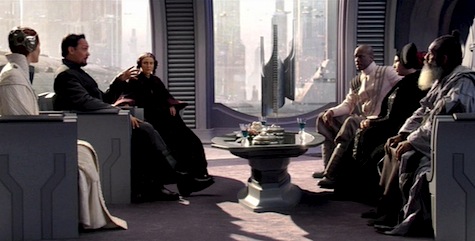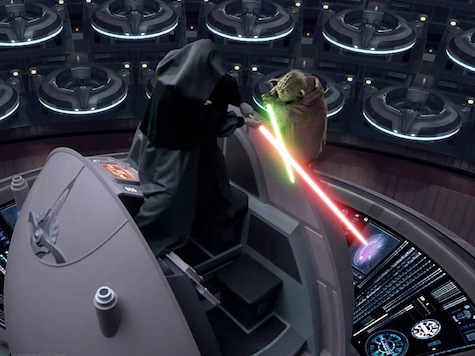While drinking the other night, a few friends and I argued the merits of economic history. Star Wars entered the picture. It was super effective. You have been warned. Read further at your own risk.
On the one hand, economics is a great lens through which to view history. If we define our metrics properly we can trace the rise and fall of nations, peering at patterns behind and beneath the “Great Men”—plagues and surplusses and farming innovations become as significant as which Caesar won what battle. And if we’re careful, we can use economics as a foundation for discussions about how human life and society have changed (or stayed the same) down millennia.
Thing is, as Mal Reynolds might say if he was my thesis advisor, there’s an awful lot of ‘if’ coming off that plan.
(Now I’m envisioning a Firefly version of the Academic Coach Taylor tumblr. Someone go make that, please? Anyway.)
It seems to me (and I am neither a professional economist nor an academic historian here, so take this whole column with the world’s biggest grain of salt) that this approach has a pretty big potential pitfall. Our choice of metrics is shaped by our historical and cultural position, which other ages and places by definition didn’t share. Imagine you’re playing checkers in one room, and your friends are playing chess in another. During a lull in your checkers game (maybe your opponent takes a long time to move), you get up and ask your chess-playing friends how their game’s going. Assume for a second that you know so little about chess that you can’t even hum the chorus of “One Night in Bangkok.” How-does-little-horsey-move territory, here. You’d probably ask questions based on your own experience of checkers, which seems similar on the surface; How many pieces have they taken? Has anyone promoted a piece yet? What’s the greatest number of pieces they’ve taken in one move? Some of these questions will be answerable; some won’t; many will have answers that don’t correlate to ‘success’ in the game in the way you’ll assume if you only know the rules of checkers. And, critically: you’ll never ask a question about check, or mate. You’ll not see forks, or board influence; you’ll be utterly confused the first time someone castles.
The modern metropolitan depends on her salary. So we might be tempted, when comparing her position in society to her forbears of a century prior, to compare salaries or bank balances. But salary-dependence is a more or less modern phenomenon—up through the late 19th century, the US was primarily rural, like everywhere else, and wage income wasn’t as vital a yardstick of economic security. In fact, the relative ease of homesteading and farming functioned as a kind of national basic income or unemployment insurance: employers had to compete for labor with the everpresent risk their employees might decide, “screw this job, I’ll go farm instead.” (See Economix for more on this theme.)
Or, consider Star Wars. Let’s assume the movies are a historical narrative. It’s pretty clear that we’re seeing Jedi Holocron history, since the most important bit of data about Galactic politics at any given time is “what are the Force users up to?” From the perspective of the Jedi Holocron, the Empire’s moment-by-moment policies don’t matter. What matters is that Palpatine and Vader are in charge, and they use the Dark Side of the Force—that Vader betrayed and murdered Anakin Skywalker, that the Emperor hunted the Jedi to extinction. Non-Jedi related issues are mentioned as an afterthought. We hear the Imperial Senate was dissolved, but never learn what that means exactly; we know nothing about the galactic economy save that smuggling’s a thing people do, and people care about spice. But we do know exactly what’s up with the Force users.

Which is the reason the audience feels such whiplash when The Phantom Menace’s opening crawl features a dispute over “the taxation of trade routes.” All of a sudden we’ve been dropped into an entirely different historiography, using different metrics: a money-and-trade story, rather than a Jedi story.
That whiplash is the problem, not the subject matter. There’s a commonplace among critics of The Phantom Menace that taxation of trade routes is inherently boring, which is just wrong—Dune is a gripping space opera that turns on equally abstruse points of politics, economics, and ecology, while huge chunks of Dorothy Dunnett’s plots turn on issues as apparently dry. (Both the first two Niccolo books can be read as slow-burn setups for elegant economic assassinations.) Hell, The West Wing’s best moments are about precisely this sort of economic and bureaucratic issue. But the Holocron telling the story seems neither to understand nor to care about the taxation issues in question, or the Trade Federation’s goals, save to the extent they’re playing catspaw for the Sith.
I’ll go a step further: the Trade Federation’s antics are no more comprehensible to the Holocron than the Jedi’s actions would be to a non-Jedi economic or military historian. We see occasional glimpses of this disconnect when ordinary citizens offer their perspective on the Jedi, the Sith, and their place in Galactic history: Han Solo’s evocation of “hokey religions and ancient weapons,” Admiral Motti’s “You don’t frighten us with your sorcerer’s ways, Lord Vader,” or even Tarkin’s “You, my friend, are all that’s left of their religion.” For most folks, the Jedi are weird, unknowable, and not the point of the story—we the viewers just assume they are, because we happen to be watching a tale told from their perspective, focusing on issues they think are important.
So, imagine the narrative an economic historian of 200 ABY would compose about the fall of the Old Republic and the rise of the Empire: a tale of peripheral revolt from a crumbling metropole, rapacious provincial governorship, and eventual rebellion leading to a military coup, which was defeated in turn by an alliance of conservative Senators with peripheral military strongholds—a story in which the Jedi figure as prominently as the soothsayer who warns Caesar to beware the Ides of March, and in which the Sith are as relevant as the Thule Society (that is to say, a creepy footnote, but a footnote nonetheless). Such a historian might well regard as frippery any claim that the Rebellion was “about” Jedi or Sith. Obviously the contrast between droid and clone means of production and force projection was the far greater issue at the time—not to mention vital and hotly contested questions of provincial taxation and trade.
Which is not to say the non-Force historian is wrong! Just that, if he spins his theories in front of a Sith Lord, he runs the risk of getting force-choked. And may that be a lesson to us all as we cast our gaze on history: be careful about our angles of analysis, lest the past strangle us, or shoot us full of Dark Side lightning.
This article originally appeared April 2, 2014 on Max Gladstone’s blog.
Max Gladstone writes books about the cutthroat world of international necromancy: wizards in pinstriped suits and gods with shareholders’ committees. You can follow him on Twitter.










